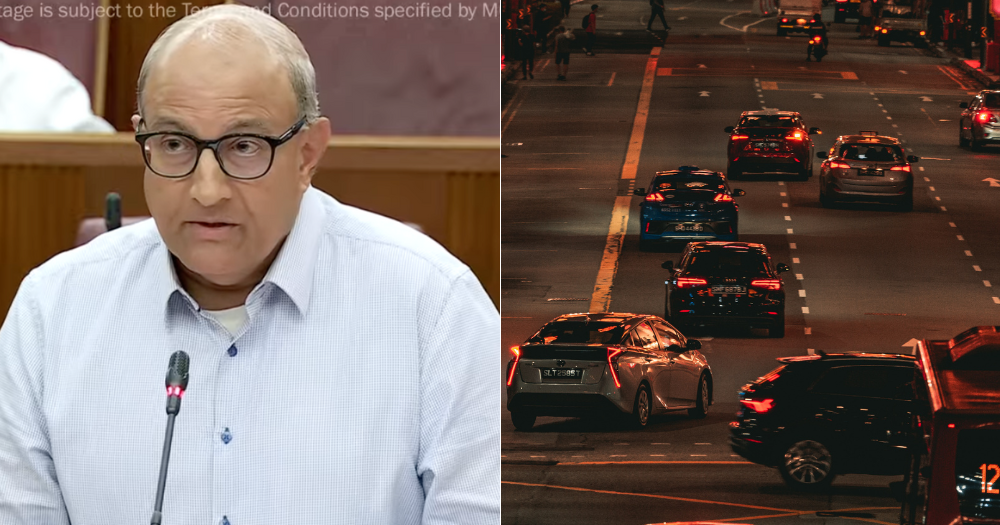Follow us on Telegram for the latest updates: https://t.me/mothershipsg
Following the six-figure record-breaking Certificate of Entitlement (COE) premiums for Category A and B cars in the latest bidding exercise on Apr. 19, 2023, Members of Parliament (MP) raised their concerns regarding the rising trend in COE prices.
Minister for Transport, S Iswaran, noted in Parliament that while there are "encouraging trends" where fewer youths aspire to own a car, he acknowledged that there is still a desire and for some, a need to own a car thus the rising cost of COEs is an understandable cause of concern.
He cited a 2022 survey in The Straits Time which showed around 50 per cent of youths aspire to own a car in 2022, compared to 65 per cent in 2016. More than 75 per cent of the respondents to the survey cited ready access to public transport as the reason they do not wish to own a car.
However, he acknowledged that there is still a desire to own a car and that the rising cost of COEs is a cause of concern.
Iswaran noted that the expected long-term trajectory for COE prices will increase as household incomes continue to increase and with the zero Vehicle Growth Rate policy.
Increase in COE premium
According to LTA's data, the COE premium for Category A cars broke the six-figure record to hit S$103,721.
Category A cars are defined as smaller cars with engine capacities that do not exceed 1,600cc and horsepower not exceeding 130bhp. These cars are usually more mainstream, catering mainly to mass-market car buyers.
The COE premium for smaller cars increased by about 7.48 per cent from the last bidding exercise on Apr. 5. The COE premium prices went up from S$96,501 to S$103,721.
For Category B, the COE premium hit an all-time high at S$120,889, an increase from S$118,501 during the last bidding exercise.
Category B cars are usually larger, more powerful cars with engine capacities exceeding 1,600cc and horsepower exceeding 130bhp.
The open car category COE, any vehicle type apart from motorcycles, increased from S$118,990 to S$124,501.
For motorcycles, COE prices rose from S$12,001 to S$12,179.
MPs raise concerns
During the Parliament sitting on May. 8, several MPs from the ruling party and the opposition raised their concerns regarding the rising trend of COE prices and what steps are being considered to moderate them.
Workers' Party MP Dennis Tan questioned how many new cars were registered by ride-hailing or private hire companies and car leasing companies.
People's Action Party (PAP) MPs Mariam Jaafar and Yip Hon Weng also enquired whether the rise in COE prices would cause the government to impose a cap on the number of Private Hire Vehicles (PHV) that PHV operators can own and consider measures to prevent private hire companies from "dominating and driving up COE prices".
PAP MP Liang Eng Hwa asked if the high COE prices will "further fuel costs increases within the economy".
PAP MPs Lee Wee Kiak and Joan Pereira questioned whether foreigners purchasing cars in Singapore impact the high COE prices.
Ministerial statement
Iswaran noted in his statement that the current COE system still serves the government's policy objective of "efficiently allocating the limited supply of COEs".
Iswaran shared that the impact of foreigners on COE prices remains low and has not changed over the years. From July 2020 to December 2022, less than three per cent of car COEs were allocated to foreigners.
Regarding multiple-car-owning households, Iswaran stated that as of Oct. 31, 2022, only 12 per cent of 471,000 households own two cars, and less than three per cent own three cars or more.
Private Hire Cars
For Private Hire Cars (PHCs), Iswaran cautioned about imposing arbitrary caps on the PHC population.
There was no commensurate upward pressure on COE prices between 2015 and 2017, where PHC numbers increased from 30,000 to 70,000.
While COE prices have been rising, the demand from PHC companies has been moderating, Iswaran shared.
One-off exercise to redistribute supply
As the COE is expected to increase substantially in the coming months as more cars reach the 10-year mark, LTA will bring forward and redistribute the supply from 5-year COEs due to expire in the next projected supply break as a one-off exercise, said Iswaran.
In a press release by LTA, 6,000 COEs will be redistributed gradually over the next few quarters, starting from the next bidding exercise in May. 15, 2023.
The COE quota for May 2023 to July 2023 will increase from 9,575 to 10,431.
Category A will see an increase of 24 per cent in the quota, while Category B will see a rise of 15 per cent.
LTA stressed that this would not change the zero Vehicle Growth Rate on the overall car popularity as LTA identified the specific vehicles in the vehicle registry with the 5-year non-extendable COEs.
When these identified vehicles are deregistered in the future, their quota will not be returned to the pool for bidding, said LTA.
"This will help to lessen, but it will not eliminate, volatility in supply. There will be a degree of supply fluctuation due to historical factors and broader market conditions," said Iswaran.
"The long-term upward trend of COE prices due to rising incomes and zero vehicle population growth will not abate."
However, Iswaran warns that while they improve the efficiency of the COE system, the goal is to become a "car-lite society with accessible and inclusive transport for all Singaporeans".
Iswaran stated that going 'car-lite' future is a key strategy where pedestrians, cyclists, and public transport users are prioritised and lessen the need for and use of private cars.
Top photos via MCI's Youtube and Unsplash
If you like what you read, follow us on Facebook, Instagram, Twitter and Telegram to get the latest updates.
